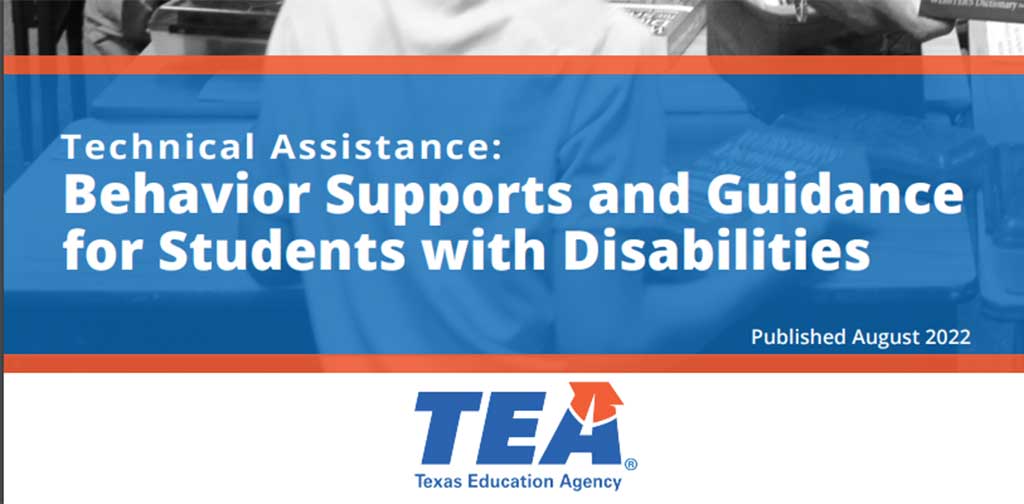Under the IDEA children with disabilities are entitled to a “free appropriate public education (FAPE) designed to meet their unique needs and prepare them for further education, employment, and independent living. FAPE requires that a school district provide special education and related services designed to meet the needs of a particular student and are in conformity with the IEP.
There is a two part process in determining if a student is to be provided services through special education. Federal regulations require that eligibility for special education services be determined by a two-step process based on:
1. The presence of a disability, and
2. The student’s need for special education and related services.
An evaluation determines if the student has a disability. The ARD/IEP committee must draw upon information from a variety of sources, including aptitude and achievement tests, parent input, and teacher recommendations, as well as information about the child’s physical condition, social or cultural background, and adaptive behavior. A child is not to be determined to have a disability if the determinant factor is based on:
- a lack of appropriate instruction in reading, including the essential components of reading instruction;
- a lack of appropriate instruction in math; or
- Limited English proficiency.
Special education is defined as specially designed instruction. Courts have ruled that if a student can receive educational benefit from the services provided in the regular classroom, even if they have a disability, they do not need specially designed instruction and therefore, do not qualify as “a child with a disability” under IDEA. Often schools provide struggling students with support services available to all students in the regular classroom, such as differentiated instruction or accommodations.
The determination process can be confusing to parents and school staff, and frequently there will be different interpretations of the data. At one time the standard practice was to only look at academic information to make this decision. Often the standard was whether the student was passing and being promoted to the next grade. The current regulations say that if a student has a disability and needs special education services, services must be provided “even though the child has not failed or been retained in a course or grade, and is advancing from grade to grade.”
In one court case dealing with a student with above average IQ, the parents asked that special education services be provided so that the student could reach or come closer to his potential. The student was receiving educational benefit in the regular classroom. The court ruled that the student did not qualify for special education services, because the law does not require that a student achieve optimum performance or reach his potential.
A 2007 5th Circuit Court of Appeals ruling also gives some guidance regarding determining “educational need”. Decisions of the 5th Circuit Court are important to students in Texas, because it is the federal court for Texas. Only decisions of the Supreme Court carry more weight for Texas than 5th Circuit Court decisions.
The court case, Alvin ISD v. A.D. dealt with a student who had been medically diagnosed with ADHD and had behavioral problems at school. The district agreed that he met the definition of other health impairment (OHI) due to the ADHD. The school also cited all of the other factors that might cause A.D. to be struggling (his baby brother had died, he was abusing alcohol, his relationship with his stepfather was strained, and his mother was pregnant). The issue was whether or not A.D. needed special services, and if so, if that need derived from his impairment. The school determined that A.D. did not need specially designed instruction. The parents asked for a due process hearing, and the hearing officer accepted the recommendations of medical experts and ruled against the school district. The school district appealed to federal court.
The 5th Circuit Court ruled that the school was right, saying that “the fact that A.D’s ADHD adversely affects his educational performance does not necessarily mean that he is eligible for special education services under the IDEA.” The court said that while adversely affecting educational performance was part of making a student eligible, there still must be a need for special education services. The court gave consideration to the fact that other factors might be causing any educational need that existed. Texas attorney Jim Walsh notes that this case “supports the notion that kids who need special help do not always require ‘special education.’, and “due to the active involvement of the SST (Student Support Team), the boy continued to progress in the general curriculum”.
If a school refuses to evaluate a student or says that there is not a need for special education, the parent should focus on whether the student is receiving educational benefit in the regular classroom. Consider if there are any indicators (grades, class and standardized tests, teacher comments, etc.) that the student is not receiving benefit or making progress in some area. Consider if behavior problems could be impacting the educational benefit the student is receiving.
If factors outside of the school might be affecting the student, the parent could work with the school or other entities to address these factors. If the school is trying other options or services to help a student improve their educational performance, it is important to monitor these efforts. If performance is not improving, the parent should request that other options be tried or again request a special education evaluation. It is important not to let too much time go by before making such a request.
A student may be making some progress toward their IEP goals, but falling further behind their peers, and state curriculum standards. So it is important to monitor these. Resources and information exist to assist parents in using school evaluations and assessments to monitor this. Failing a statewide assessment can be a key sign that a student needs more help or different strategies.
Educational Needs Go Beyond Academics
State hearing officers and state and federal courts have found that special education, related services encompass more than just academic progress. The Fifth Circuit has recognized the importance of non-academic needs in providing an educational benefit. Specifically, the Fifth Circuit uses, as one prong of analysis, the demonstration of positive academic and non-academic benefits to determine if a child’s IEP is reasonably calculated to provide an educational benefit.
In a court case involving Lewisville Independent School District, an academically gifted student was diagnosed with Asperger’s Syndrome. The hearing officer determined that the special education program offered by the district was not appropriate, in part, because non-academic benefits were not demonstrated. The hearing officer concluded that the district failed to address social skills needs by not developing an appropriate behavior intervention plan.
Recently, the Maine District Court, concurred with the importance of non-academic needs.
The Court found that a student with Asperger’s Syndrome was eligible for special education and related services, even though she made excellent academic progress. In reaching the decision, the court held that educational performance encompassed not merely the acquisition of academic knowledge but also the cultivation of skills and behaviors needed to succeed generally in life. This decision was, in part, based on State curriculum goals addressing language, oral presentations, responsible personal and social behaviors in physical activity settings, career preparation including teamwork and handling change.
The most comprehensive discussion on the importance of non-academic needs comes from the California State Education Agency.
In the decision, the hearing officer found that the Burbank School District had not offered a free appropriate public education to a ninth-grade student with Asperger’s Syndrome. The hearing officer stated that the: “District’s offered placement is not designed to meet STUDENT’S unique needs because STUDENT’S social skills have not improved during the three years she attended the District’s social skills program, and therefore this program holds no promise for the future; the District’s Academy teacher does not have the appropriate qualifications to meet STUDENT’S unique needs; the District’s program does not offer a sufficient amount of social skills counseling; and the District’s proposed placement does not address STUDENT’S continued and growing anxiety caused by the stress of passing periods, teasing, and noise.”
The Office of Special Education Programs (OSEP) specifically has stated that a child’s educational performance must be determined on an individual basis and should include non-academic as well as academic areas. Since the educational needs of a child with a disabling condition include non-academic as well as academic areas, the term “’educational performance”’ means more than academic standards as determined by standardized measures.
In a Policy Letter titled “Letter to Lybarger” issued September 14, 1990, OSEP further clarified that in determining a child’s specific needs, the child must be assessed in all areas related to the suspected disability; including, if appropriate, health, vision, hearing, social and emotional status, general intelligence, academic performance, communicative status and motor abilities.
OSEP Policy “Letter to William”, (March 24, 2000), which addresses the identification and evaluation of children with Asperger’s Syndrome, describes developing an IEP for a child that that includes measurable annual goals, including benchmarks or short-term objectives related to meeting the needs that arise from the child’s disability, to enable the child to be involved and progress in the general curriculum, as well as meeting each of the child’s other educational needs that result from the child’s disability.
As previously discussed, a child’s educational needs include academic and non-academic areas, necessitating an IEP that addresses both areas of need. Additionally, the related services necessary for any child are determined on an individual basis by the child’s IEP team. Accordingly, a child’s IEP must include related services, such as social skills training, which are not specifically identified in the IDEA, but which are required for a child.
Accordingly, FAPE includes the recognition of academic and non-academic needs including, but not limited to, social skills, language, and behavior. In addition, to provide FAPE, a district must ensure that the student makes significant progress in each area of need, be it academic or non-academic.
New federal and state regulations, as well as current philosophy, emphasize reducing the number of special education students and meeting the needs of struggling students through a variety of general education procedures and programs. This emphasis has and will continue to increase the number of cases where schools refuse to evaluate students and/or decide that a student does not need special education services.
At times a school may say that a student who is receiving special education services does not need a certain related service. IDEA regulations define related services as “services required to assist a child with a disability to benefit from special education”. The law states that related services must be provided when needed to enable the student “to be involved in and make progress in the general education curriculum”. Parents should ask the school, “W hy do you believe that my child does not need this service to benefit from special education and to be involved in and make progress in the general curriculum?” If the school refuses to provide a requested related service, the parents can ask for a written notice of refusal. This notice must state:
1. what the school is refusing to do;
2. what the school decided to do instead;
3. the data on which that decision was based; and
4. and the other options which were considered.
Information provided by: Walsh, Anderson, Brown, Schulze & Aldridge, PC; newsletter, “This Just In” (#211, October, 2007); Stacy Therese Cherry, J.D.; and Wrightslaw (www.wrightslaw.com).



